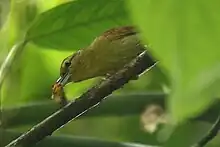Russet antshrike
The russet antshrike (Thamnistes anabatinus) is a passerine bird in the antbird family.
| Russet antshrike | |
|---|---|
 | |
| Scientific classification | |
| Domain: | Eukaryota |
| Kingdom: | Animalia |
| Phylum: | Chordata |
| Clade: | Dinosauria |
| Class: | Aves |
| Order: | Passeriformes |
| Family: | Thamnophilidae |
| Genus: | Thamnistes |
| Species: | T. anabatinus |
| Binomial name | |
| Thamnistes anabatinus Sclater, PL & Salvin, 1860 | |
 | |
It is a resident breeder in the tropical New World from southern Mexico to northern Bolivia.
It is a bird of forest, old second growth, semi-open woodland and edges up to 1,500 m (4,900 ft) altitude. The female lays two brown-speckled white eggs in a deep cup nest 7–15 m (23–49 ft) high in a tree, usually in a semi-open location. Nest-building, incubation, and care of the young are shared by both sexes.
The russet antshrike is a small antbird, typically 14 cm (5.5 in) long and weighing 21 g (0.74 oz). It has a heavy hooked bill and brown upperparts, becoming rufous on the wings and tail. It has a dark eyestripe and a buff supercilium. The underparts are olive buff. Sexes are similar, but the male has a concealed rufous-orange patch in the centre of his back. Young birds are similar to the adults, but have rufous fringes to the wing coverts and are paler below. The call is a squeaky sweek, and the song is cheep cheep CHEEP CHEEP cheep.
The russet antshrike feeds on insects and other arthropods, which it gleans from foliage like a vireo. It may be seen alone, in pairs, or with tanagers and warblers in mixed-species feeding flocks
The russet antshrike was described by the English ornithologists Philip Sclater and Osbert Salvin in 1860. They erected the genus Thamnistes to accommodate the species and coined the binomial name Thamnistes anabatinus.[2] The specific epithet is from the Ancient Greek anabatēs meaning "climber" or "mounter".[3]
References
- BirdLife International (2017). "Thamnistes anabatinus". IUCN Red List of Threatened Species. 2017: e.T103660237A112313618. doi:10.2305/IUCN.UK.2017-1.RLTS.T103660237A112313618.en. Retrieved 11 November 2021.
- Sclater, Philip L.; Salvin, Osbert (1860). "Characters of eleven new species of birds discovered by Osbert Salvin in Guatemala". Proceedings of the Zoological Society of London. 28 (2): 298-301 [299]. Archived from the original on 2020-12-29. Retrieved 2018-03-04.
- Jobling, James A. (2010). The Helm Dictionary of Scientific Bird Names. London: Christopher Helm. p. 46. ISBN 978-1-4081-2501-4.
Further reading
- Skutch, Alexander F. (1969). "Russet antshrike" (PDF). Life Histories of Central American Birds III: Families Cotingidae, Pipridae, Formicariidae, Furnariidae, Dendrocolaptidae, and Picidae. Pacific Coast Avifauna, Number 35. Berkeley, California: Cooper Ornithological Society. pp. 197–200. Archived (PDF) from the original on 2016-06-12. Retrieved 2020-12-15.
